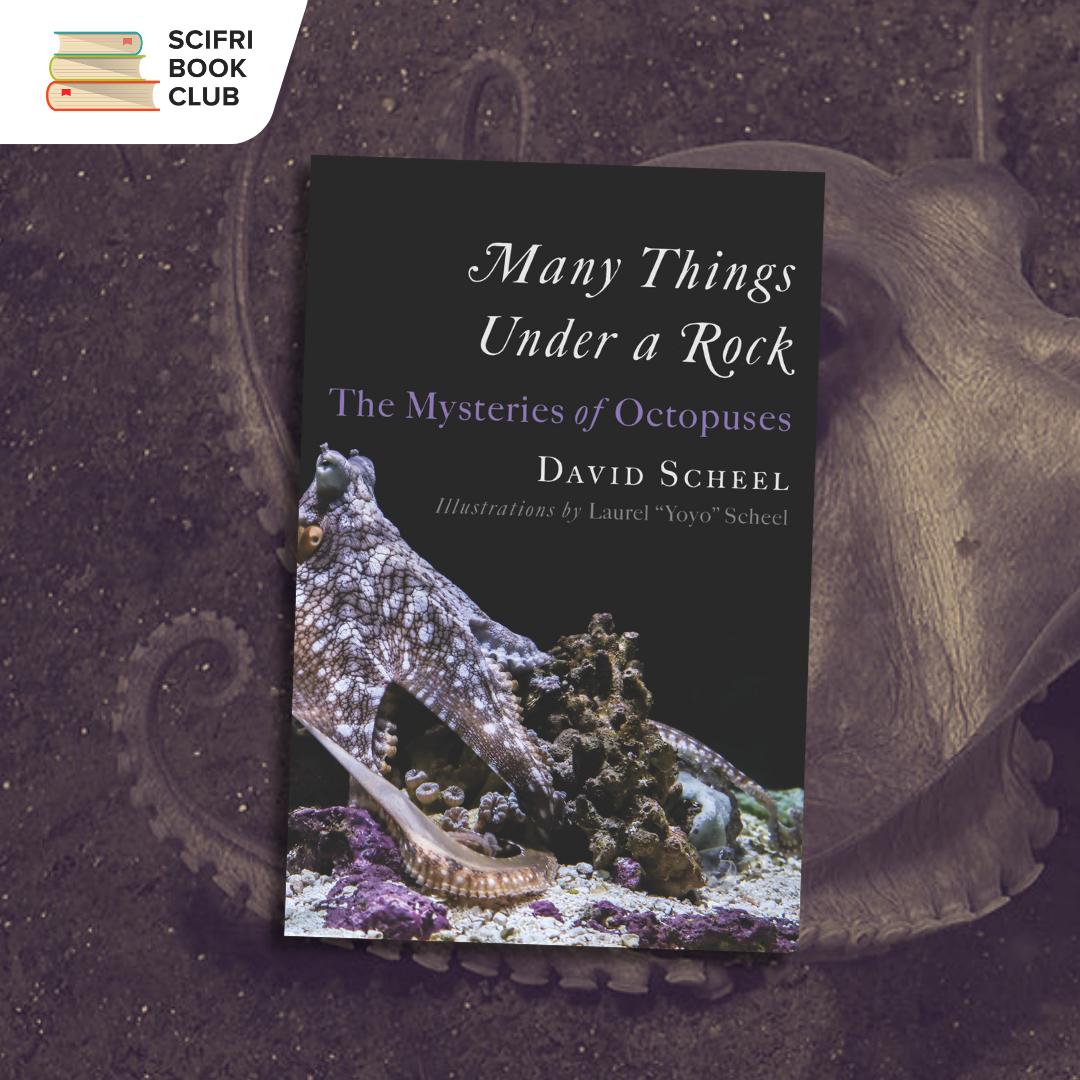Many Things Under a Rock: The Mysteries of Octopuses
Octopuses seem otherworldly, and as Scheel examines key mysteries that have driven his work, he unearths just how much there is left to learn about these charismatic cephalopods.
Octopuses seem otherworldly, and as Scheel examines key mysteries that have driven his work, he unearths just how much there is left to learn about these charismatic cephalopods.
 Welcome to the SciFri Book Club page about David Scheel’s Many Things Under a Rock. There’s lots of ways to participate: Get the book, join our community space, attend an event, sign up for our email newsletter, or send us a message via our contact page.
Welcome to the SciFri Book Club page about David Scheel’s Many Things Under a Rock. There’s lots of ways to participate: Get the book, join our community space, attend an event, sign up for our email newsletter, or send us a message via our contact page.
 In June 2025, for National Ocean Month and Cephalopod Week, the SciFri Book Club read Many Things Under a Rock: The Mysteries of Octopuses by David Scheel. Octopuses live incredible lives in the oceans—shifting colors, outsmarting predators, and engaging with the world in ways that question our ideas about intelligence. Marine biologist David Scheel has spent decades studying these unreachable animals off the coast of Alaska and beyond. In Many Things Under a Rock, he welcomes us into their underwater world. We’ll learn not just about the biology and behaviors of octopuses, like how they hunt, hide, and maybe even dream, but also the cultural and ecological links that affect their lives, such as climate change. Scheel combines scientific discovery with personal reflection to reveal the complexity of one of nature’s most mysterious animals.
In June 2025, for National Ocean Month and Cephalopod Week, the SciFri Book Club read Many Things Under a Rock: The Mysteries of Octopuses by David Scheel. Octopuses live incredible lives in the oceans—shifting colors, outsmarting predators, and engaging with the world in ways that question our ideas about intelligence. Marine biologist David Scheel has spent decades studying these unreachable animals off the coast of Alaska and beyond. In Many Things Under a Rock, he welcomes us into their underwater world. We’ll learn not just about the biology and behaviors of octopuses, like how they hunt, hide, and maybe even dream, but also the cultural and ecological links that affect their lives, such as climate change. Scheel combines scientific discovery with personal reflection to reveal the complexity of one of nature’s most mysterious animals.
Many Things Under a Rock brings together a range of topics, including evolution, marine biology, anatomy, ecology, animal behavior and more—and we’ll touch on these ideas throughout this Book Club season. You can get your copy from your local bookstore or on Bookshop.org.
This Book Club finished on June 30, 2025, but there are still so many ways to dive in and participate! You can grab a copy of the book (and support the author and SciFri), join the discussion in our online Book Club community, host your own group using our discussion questions, sign up for our email newsletter to discover new reads, or watch a recording from a previous Book Club event. There is even a young readers edition for aspiring marine biologists. Check out all the details below.
 If you’d like to purchase a physical copy, we encourage you to start local! Check out the SciFri Book Club partner bookstores and libraries—if you’re in the area, consider supporting your local bookseller or public library (plus, mention our Book Club for a percentage off your purchase at participating shops!).
If you’d like to purchase a physical copy, we encourage you to start local! Check out the SciFri Book Club partner bookstores and libraries—if you’re in the area, consider supporting your local bookseller or public library (plus, mention our Book Club for a percentage off your purchase at participating shops!).
If they don’t have the book in stock or you’d rather purchase online, you can support Science Friday by buying your copy on our Bookshop.org page.
Want more ways to read? This book is available in a few formats via online retailers, your local library, or elsewhere:
Your local library may not currently have Many Things Under a Rock in its catalog, but many branches offer options for patrons like you to submit book suggestions to librarians. Look for ways to suggest new titles via the Libby or OverDrive app, a form on your library’s website, or a suggestion box at your local branch! There is also a young readers edition for aspiring marine biologists.

We’re publishing this discussion guide, so that you can host a SciFri Book Club locally—in your library, at your school, or in your home. We offer one discussion question a week over the course of the month, for a total of four questions for each book. This gives everyone time to read the book while offering regular opportunities to share their thoughts and ask questions, but your group may prefer a different cadence.
You are free to use these questions to foster discussion with your own book club or for educational programs. We ask that you attribute the work to Science Friday. If you would like to host a local SciFri Book Club, please partner with us to help spread the joy of science to your community.
Working with learners? Visit our educational resource, “Discover The Mysteries Of Octopuses” for discussion questions based on the young readers edition.
In the opening chapters of Many Things Under a Rock, David Scheel introduces us to octopuses not just as scientific subjects, but as elusive, mythic creatures shaped by culture, climate, and curiosity. With limited funding and few formal studies, much of what we knew came from divers, Native knowledge holders, and stories passed between generations. What assumptions did you bring into the book about octopuses? How has Scheel’s science-cultural narrative changed your view of marine research?
Octopuses are master strategists when it comes to surviving in the wild. From digging stealthy dens and changing their appearance on the fly, to bluffing predators with decoy ink clouds, octopuses display an impressive toolkit to ward off their enemies. In these chapters, we also learn how prey animals, like decorator crabs and mussels, develop their own clever defenses, and how both traditional and scientific knowledge help us make sense of these complex predator-prey relationships. What stood out to you about how octopuses choose their prey or avoid becoming prey themselves? What did you learn about cephalopod intellect and strategy?
In these chapters, Scheel asks us to rethink what it really means to experience and interact with the world by diving into the octopus’s unusual sensory toolkit. Their eyes sense polarized light in addition to visible spectra, while chromatophores in their skin can detect and respond to changes in light independent of their eyes. Their arms, full of taste and touch sensors, work with a surprising independence from their brains. By comparing these senses to our own and those of other animals, Scheel uncovers both unexpected differences and intriguing similarities. How do octopuses’ peculiar nervous system affect their behavior differently from humans? How does this challenge the human concept of mind and consciousness?
As we reach the final chapters of Many Things Under a Rock, Scheel asks us to think more deeply about the emotional and social lives of octopuses. Although they are often described as solitary or even cannibalistic, they also display behaviors that suggest recognition, memory, and intentional action. From sharing dens to throwing objects at one another, these moments challenge common ideas about emotion and awareness in non-human animals. To what extent did Scheel’s findings cause you to reconsider the emotional and social capacities of cephalopods? How was your perspective impacted?
 Many Things Under a Rock: Livestream and Q&A with David Scheel
Many Things Under a Rock: Livestream and Q&A with David ScheelOctopuses have long captured our imaginations, yet much about their lives remains unknown. Marine biologist David Scheel shares his discoveries in Many Things Under a Rock, weaving together the story of one unreachable octopus with deep insights into the biology, behavior, and changing ecosystems that shape these remarkable creatures.
Join us online for a livestream all about the science topics featured in the SciFri Book Club pick for June 2025. Come with your queries and wonderings—we’ll be taking your questions in the livestream comments!
 Want to meet other SciFri Book Club members, talk about the book selection, and find more resources for deeper learning—all without leaving your home? Our community meeting is the place for you!
Want to meet other SciFri Book Club members, talk about the book selection, and find more resources for deeper learning—all without leaving your home? Our community meeting is the place for you!
This discussion meeting will focus on themes and topics featured in Many Things Under a Rock. You’re welcome to join us no matter your reading progress—come chat with other science-interested folks about evolution, marine biology, anatomy, ecology, animal behavior and more.
And as you start reading, join us on our online community space: the SciFri Book Club is on Mighty Networks, a platform where we can gather, read and discuss science books together. We’ve built this community space to create a better way for readers to stay connected with other Book Clubbers, and we hope you’ll join us there!
Subscribe to SciFri Book Club emails to stay updated on our monthly read sand join us for community discussions. We’ll send emails a few times per week.